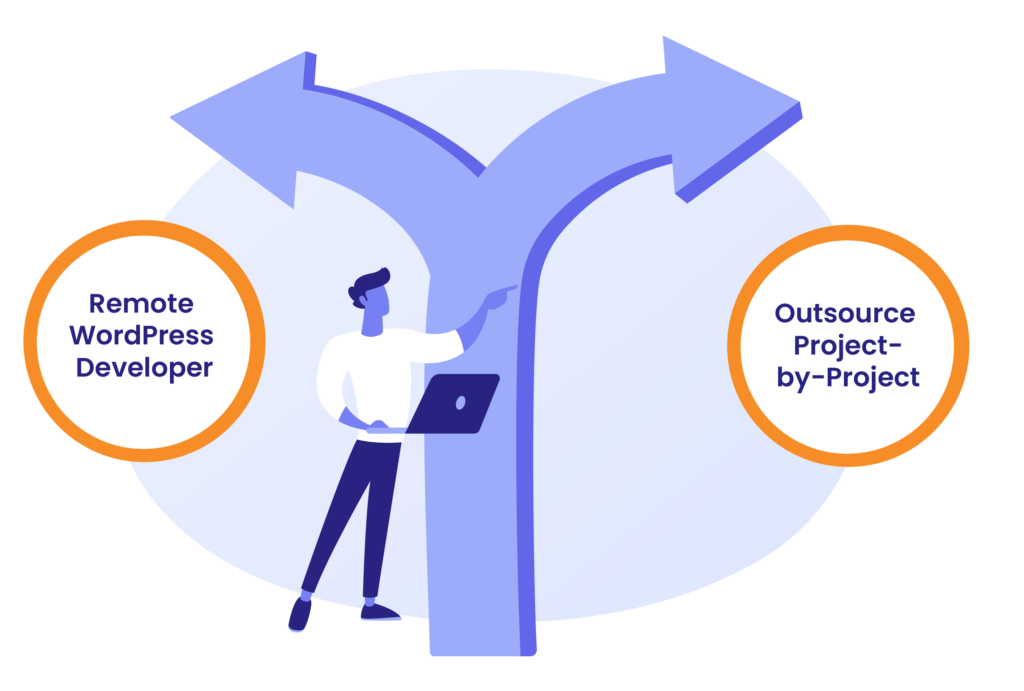There are many reasons to look for a remote WordPress developer to join your digital agency’s team.
The agencies that reach out to us typically have more work coming in than they can deliver, and don’t want to, or cannot, hire developers to work from their office location.
Two ways to outsource WordPress development
We offer two different types of services to meet this demand, and this article is a guide to help choose between them.
Service type 1: Hiring a remote WordPress developer
The first type of service is to hire a remote WordPress developer from our team and have them work directly with you.
This is similar to having your own remote employee, or to work with a freelancer. The difference is that they’ll be on a contract that you can cancel with short notice, and managed by an agency that can add more developers or replace your developer with someone else if needed.
Service type 2: Outsourcing WordPress development projects
The second type of service we offer is to code WordPress websites from design files. While your remote WordPress developer could be doing exactly the same, this service is on a per-project basis.
For us, the project starts when we receive your design files and our first step will be to provide a fixed-price quote for turning them into custom WordPress websites. Upon approval of the quote, we assign a developer from our “project-based pool” to do the coding and have our Quality Assurance team do the testing.
Shared characteristic: Both types add a flexible layer of capacity
One of the benefits of outsourcing is that it provides a flexible layer to your capacity. Both types of services accomplish this, but in different ways.
One of the benefits of outsourcing is that it provides a flexible layer to your capacity. Both types of services accomplish this, but in different ways.
Hiring full-time remote WordPress developers from an agency give you the ability to cancel contracts on fairly short notice and to add more people to your team when you need to scale up.
If you work on a per-project basis with your outsourcing partner, on the other hand, you have full control of your costs and can send five projects at once in one month, and no projects at all in the next. It doesn’t get more flexible than that.
Since we offer both dedicated remote developers and project-based development, we have a lot of experience helping agencies decide which plan works best for them.
So for the rest of this article, I will share the main factors that play into the decision.
Factors to consider when choosing the type of outsourcing service
There are 4 main factors that I consider when recommending an agency to either hire a remote WordPress developer or to outsource their work on a per-project basis
- Type of work
- Style of working
- Specific preferences for development
- Amount of work
Decision factor 1: Type of work for your remote WordPress developer
If you need help with taking care of scheduled and requested updates to old websites, it’s good to have the same remote developers every time. They would know how your websites are built and you can trust them to know what to do when working in your systems.
Assigning such updates on a per-project basis is possible, but not as easy. For us, it’s not always practical to have the same developer available, since we need to let them work on other projects too. Additionally, it’s more difficult to estimate how long it will take to perform fixes on existing sites than to build new websites from scratch.
If you primarily want to have your remote WordPress developers build new websites from scratch, you could consider having them work on a per-project basis as well. The scope, timeline, and price are easier to define, and there’s less back-and-forth needed with the developer during the project.
For very large projects, however, say over 160 hours of development time needed, it tends to be difficult to write requirements that cover all the things your developers need to know. In this case, we’ve seen that preparing good instructions upfront and hiring the developer to work for you on an hourly basis works better. This way you can keep close communication and adjust the scope without having to request a new quote for the additional work.
Most agencies will have a mix of maintenance tasks and new website development. For this scenario, you can either have full-time remote WordPress developers to handle all of those tasks, or use a mix of in-house developers, remote developers, and outsourced website development projects.
Decision factor 2: Style of working with remote WordPress developers
If we look at full WordPress development projects, some agencies prefer to work closely with their developers during the build phase, while others work with clear handovers and less daily interaction.
In our experience, a process with clear handovers has a great benefit, especially when working with remote WordPress developers. With a development brief and all pages designed in advance, you don’t need to spend much time discussing and waiting for answers.
If you’re used to working with in-house developers, this might not seem like a big deal. But working with a remote developer means you’re not entirely sure when they’ll reply, and unless you are quick to get on calls or even video calls, you’ll spend much more time clarifying what you mean and resolving misunderstandings.
Decision factor 3: Specific preferences for how websites should be developed
We have worked with hundreds of digital agencies. Many have adopted similar best practices, but we also know that many agencies have their own preferences for how their websites should be built.
- Should we use page-builders or Advanced Custom Fields?
- Do you need support for Internet Explorer 11 or not?
- Should the homepage show the three latest blog posts by default or a manual selection?
- Do you prefer Gravity Forms, Contact Form 7, or some other form plugin?
Add to that all the pet peeves that agencies have around the way their websites work on mobile, naming of fields in the backend, etc. and you understand that it could take a bit of time to get used to working with any given agency.
When we work with agencies on a per-project basis, we assign the next available developer to work on their projects as they come in. For agencies with a long list of preferences, we try to assign developers that have worked for them before, but that’s subject to availability.
For these agencies, we normally recommend hiring a remote WordPress developer from us instead to make the relationship more efficient.
Decision factor 4: Amount of WordPress development work needed
Last but not least, the decision between hiring a remote WordPress developer and working with a development partner on a per-project basis comes down to the amount of work you need to do.
We offer lower rates for full-time developers than we have for fixed-price projects. So if you have enough work to keep a full-time developer engaged, it’s usually cheaper to rent one full-time.
If you have two or more full website projects that you need to build every month, our rule of thumb is that it’s worth exploring hiring a remote WordPress developer from our team.
Final thoughts
If you want to explore the two options further, you can read more on our service pages:
- Adobe XD to WordPress conversion (or other design formats)
- Hire a WordPress developer
You can also send us a message using this form below to tell us about your needs and get direct consultation on what model we would recommend:



